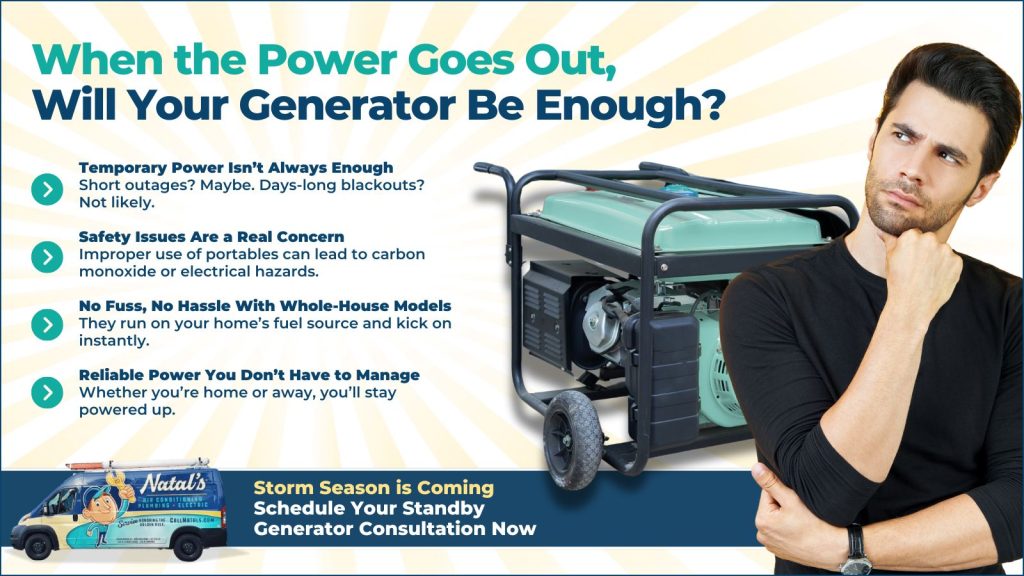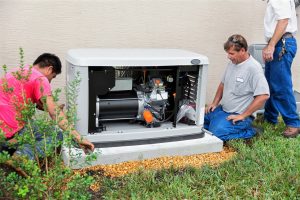As storm season approaches, it’s essential for homeowners to think ahead about power reliability. In areas that experience frequent thunderstorms, hurricanes, or grid outages—such as Florida and much of the Southeastern US—losing power isn’t a matter of if, but when.
Portable generators offer a temporary solution, but for true peace of mind, a whole-house generator is the smarter investment. If you’re deciding how to protect your home during storm season, understanding the pros and cons of each option is key.

What Are Portable Generators Good For?
Portable generators can be an effective stopgap in an emergency. They’re most commonly used for:
- Powering essential appliances: You can plug in a refrigerator, freezer, or small window AC unit to keep basic necessities running.
- Temporary use during outages: They’re great for short-term outages lasting a few hours to a day or two.
- Remote or recreational use: Campers, tailgaters, or construction sites often use portable generators where grid power isn’t available.
They’re relatively affordable, easy to store, and flexible in terms of where and how they can be used. However, these benefits come with major trade-offs—especially when it comes to powering an entire home during a prolonged outage.
The Limitations of Portable Generators
When a major storm knocks out power for several days or more, the limits of a portable generator become painfully clear:
- Limited power output: Most portable models can only support a few appliances at a time. You’ll need to manually choose between powering your refrigerator, HVAC, or medical devices.
- Manual operation: You’ll have to wheel it out, start it, refuel it, and manage extension cords—often in unsafe weather conditions.
- Fuel dependency: Portable generators run on gasoline or propane, which may be difficult to find during a widespread outage or natural disaster.
- Safety hazards: Improper use can lead to carbon monoxide poisoning, fire risks, or backfeeding into the grid—making them dangerous if not used correctly.
- Noise and maintenance: Portable units can be loud and require routine maintenance to remain reliable.
In short, portable generators provide limited, short-term relief—not a long-term power solution.
Why a Whole-House Generator Is a Smarter Investment
Whole-home generators (also known as standby generators) are designed to seamlessly power your entire home during an outage. Unlike portable models, they automatically detect power loss and restore electricity within seconds. Here’s why they’re worth the investment:
- Automatic activation: No need to go outside or flip switches—your power stays on even if you’re not home.
- Complete coverage: Keep your HVAC system, refrigerator, lights, medical equipment, security systems, and more running smoothly.
- Runs on natural gas or propane: No need to refuel constantly; whole-house systems are connected to your home’s fuel source.
- Peace of mind during extended outages: Whether a storm knocks out the grid for hours or days, you’ll have reliable, continuous power.
- Added home value: Whole-house generators are attractive features for potential buyers and may lower homeowner’s insurance in some cases.
Prepare Now for the Unpredictable
History shows us how vulnerable the power grid can be during severe weather. Hurricanes like Irma, Michael, and Ian left millions without power for days. As climate events grow more extreme, outages are becoming more common and longer lasting. Investing in a whole-house generator isn’t just a convenience—it’s a strategic decision for your family’s safety and comfort.
Natal’s Air Conditioning, Plumbing & Electrical. Service Honoring the Golden Rule.

